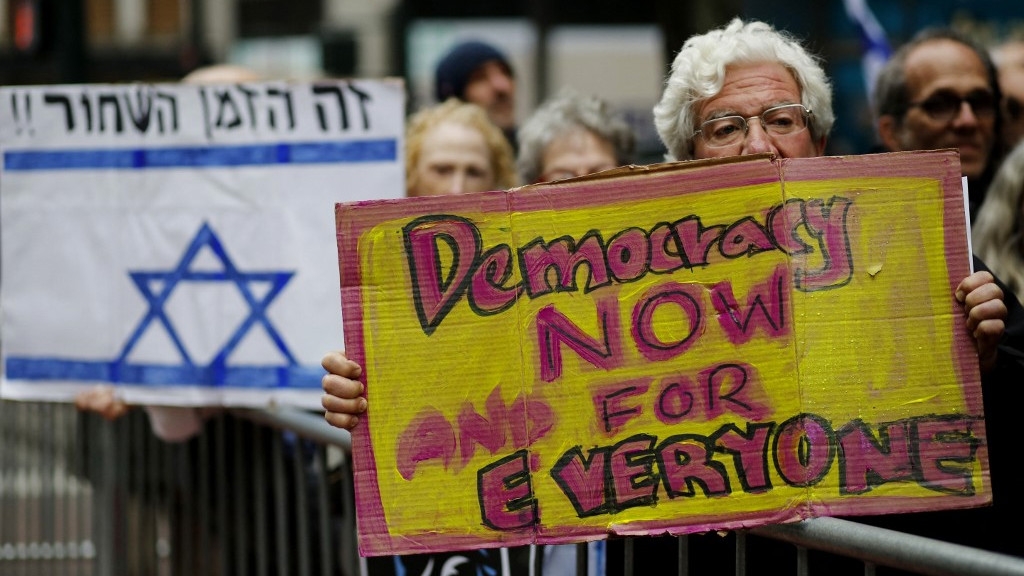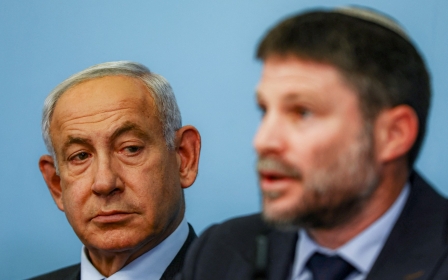Israel was never a democratic state, from 1948 to now

In the wake of the political crisis in Israel over the “judicial reforms” proposed by the government of Prime Minister Benjamin Netanyahu, debate has emerged over how the state can avoid falling into total dysfunction.
Today, Israel is at best a deficient democracy, paralysed and handcuffed.
Many have warned that Israel’s “democratic” model is in danger under the new far-right government. The former president of Israel’s Supreme Court, Aharon Barak, has described the government’s planned judicial overhaul as a “coup without tanks” that could turn Israel into a “hollow democracy”.
Last month, amid a massive public outcry, Netanyahu agreed to put the plan on pause.
Digging deep into the roots of the Zionist doctrine upon which Israel was established, we can better understand what led to this point. Israel was founded in 1948 as a “Jewish state”, and deemed as such in the country’s Declaration of Independence. This principle was further enshrined in the 2018 Jewish nation-state law.
New MEE newsletter: Jerusalem Dispatch
Sign up to get the latest insights and analysis on Israel-Palestine, alongside Turkey Unpacked and other MEE newsletters
The 2018 law also stipulated that a “united Jerusalem” was the capital of Israel, and confirmed that Hebrew was the state language and the Hebrew calendar was the official state calendar.
Early decisions by Israel’s founding fathers included a failure to produce a constitution. Although the Declaration of Independence set out a timeframe for adopting a constitution by October 1948, elections to the Constituent Assembly did not take place until the following year, and the assembly held just four meetings.
In February 1949, the assembly approved a transitional law, transforming itself into the first Knesset - and the task of drawing up a constitution fell to parliamentarians.
Cross-party denial
Debate continued until June 1950, when the Knesset adopted a compromise resolution known as the Harari proposal, under which a parliamentary committee was designated to prepare the constitution.
The proposal noted: “The constitution will be made up of chapters, each of which will constitute a separate basic law. The chapters will be brought to the Knesset, as the Committee completes its work, and all the chapters together will constitute the constitution of the state.”
But this task was never finished, and the Knesset has passed only 13 basic laws since. In the meantime, what lessons can be drawn from these years of debate?
The first is that there is cross-party denial among Israeli Zionist political movements about the nature of the modern civil state. Many would argue that the state cannot be seen as an instrument of enforcement for a particular ethnicity, cultural group or religion. Such visions contradict the notion of the state as a sovereign system of government committed first and foremost to the safety and well-being of its citizens, regardless of their religion or ethnic affiliation.
Secondly, Israel is based on the rule of an ethnic majority, rather than a political majority. While in other countries such as the US, the political majority changes after elections, Israel is always devoted to serving the needs of its ethnic majority, regardless of electoral outcomes - a concept that is antithetical to democracy. The nation-state law only codified Israel’s preexisting oppressive and discriminatory practices.
Thirdly, as long as Israel is an occupying state, it cannot possess the legitimacy provided by the term “democratic system”, and it is acting in contravention of international laws and norms.
Finally, in a true democracy, the political system is generally constrained by a constitution or a political culture of restraint. Neither applies in the case of Israel.
The subject of the essence of Israeli democracy is beyond the scope of a single article, but an instructive example comes from the 2008 book of late Meretz leader Shulamit Aloni, titled Democracy in Shackles. Stressing the need to preserve Israel’s democratic character more than its Jewish character, Aloni cited various threats to this model, including the rise of far-right extremism.
The country’s veins have been corrupted by the poison of religious fundamentalists and settlers, she noted, highlighting how Israel has failed to grasp the true meaning of democracy. Today, this warning resounds more than ever.
The views expressed in this article belong to the author and do not necessarily reflect the editorial policy of Middle East Eye.
Middle East Eye delivers independent and unrivalled coverage and analysis of the Middle East, North Africa and beyond. To learn more about republishing this content and the associated fees, please fill out this form. More about MEE can be found here.






